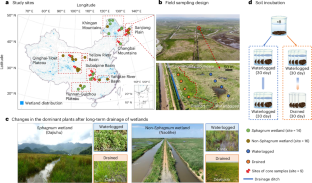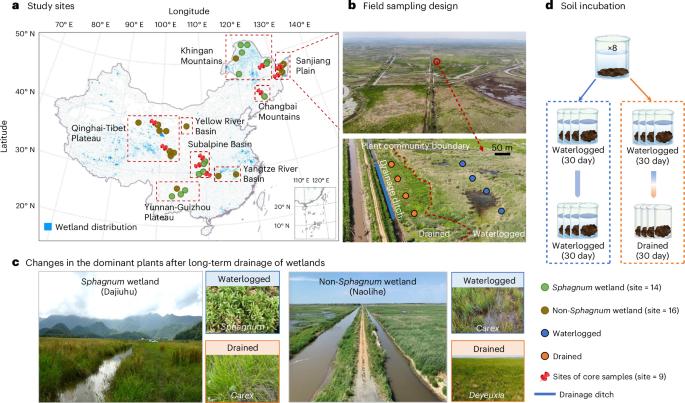Plant–microbe interactions underpin contrasting enzymatic responses to wetland drainage
IF 27.1
1区 地球科学
Q1 ENVIRONMENTAL SCIENCES
引用次数: 0
Abstract
The carbon storage of wetlands is related to inhibited enzyme activity (particularly phenol oxidase) under oxygen-deprived conditions. However, phenol oxidase response to field drainage is highly uncertain, constraining our ability to predict wetland carbon–climate feedbacks. Here, using literature data, laboratory simulations and a pair-wise survey of 30 diverse wetlands experiencing long-term (15–55 years) drainage across China, we show that while short-term drainage generally leads to increased phenol oxidative activity, its response to long-term drainage diverges in Sphagnum versus non-Sphagnum wetlands. In non-Sphagnum wetlands, long-term drainage is linked to increased plant secondary metabolites and decreased phenol oxidase-producing microbes, while in Sphagnum wetlands, drainage is linked to replacement of antimicrobial Sphagnum by vascular plants and increased phenol oxidative activity with cascading effects on hydrolytic enzymes. Our findings highlight that trait-based plant dynamics are pivotal to decipher wetland carbon dynamics and feedback to climate change under shifting hydrological regimes. The authors investigate the carbon storage response of wetland drainage in the context of rate-limiting phenol oxidase activity. They show divergent responses to short- and long-term drainage in Sphagnum versus non-Sphagnum wetlands determined by plant traits and plant–microbe interactions.


植物与微生物之间的相互作用支撑着对湿地排水的截然不同的酶反应
湿地的碳储存与缺氧条件下酶活性(尤其是酚氧化酶)受抑制有关。然而,酚氧化酶对田间排水的反应非常不确定,这限制了我们预测湿地碳-气候反馈的能力。在此,我们利用文献数据、实验室模拟和对中国各地经历长期(15-55 年)排水的 30 个不同湿地的配对调查表明,虽然短期排水通常会导致酚氧化活性增加,但在泥炭藓湿地和非泥炭藓湿地中,酚氧化活性对长期排水的响应是不同的。在非泥炭藓湿地,长期排水与植物次生代谢物的增加和产酚氧化酶微生物的减少有关,而在泥炭藓湿地,排水与维管植物取代抗菌泥炭藓和酚氧化活性的增加以及对水解酶的连锁反应有关。我们的研究结果突出表明,在水文制度不断变化的情况下,以植物性状为基础的动态变化对于解读湿地碳动态和气候变化反馈至关重要。
本文章由计算机程序翻译,如有差异,请以英文原文为准。
求助全文
约1分钟内获得全文
求助全文
来源期刊

Nature Climate Change
ENVIRONMENTAL SCIENCES-METEOROLOGY & ATMOSPHERIC SCIENCES
CiteScore
40.30
自引率
1.60%
发文量
267
审稿时长
4-8 weeks
期刊介绍:
Nature Climate Change is dedicated to addressing the scientific challenge of understanding Earth's changing climate and its societal implications. As a monthly journal, it publishes significant and cutting-edge research on the nature, causes, and impacts of global climate change, as well as its implications for the economy, policy, and the world at large.
The journal publishes original research spanning the natural and social sciences, synthesizing interdisciplinary research to provide a comprehensive understanding of climate change. It upholds the high standards set by all Nature-branded journals, ensuring top-tier original research through a fair and rigorous review process, broad readership access, high standards of copy editing and production, rapid publication, and independence from academic societies and other vested interests.
Nature Climate Change serves as a platform for discussion among experts, publishing opinion, analysis, and review articles. It also features Research Highlights to highlight important developments in the field and original reporting from renowned science journalists in the form of feature articles.
Topics covered in the journal include adaptation, atmospheric science, ecology, economics, energy, impacts and vulnerability, mitigation, oceanography, policy, sociology, and sustainability, among others.
 求助内容:
求助内容: 应助结果提醒方式:
应助结果提醒方式:


